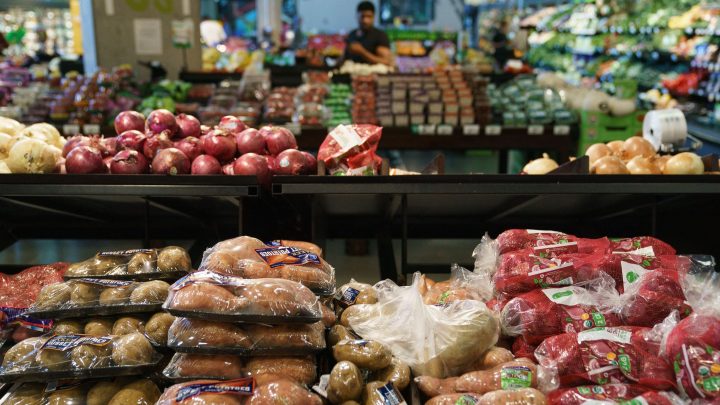
Why do some states still have a grocery tax?
Share Now on:
Why do some states still have a grocery tax?

On Sept. 1, Alabama shoppers saw their grocery bills shrink — a bit. The state dropped its tax on non-prepared food to 3%, down from 4%. While it’s an incremental decrease, the change could have a big impact in a place where one in six adults and one in four children are experiencing food insecurity.
Chances are, if you live in the U.S., you probably don’t pay a tax on your groceries. As of 2023, just 13 states have some form of grocery tax. The rest have exemptions for groceries or no sales tax at all.
For the states that do have them, grocery tax revenue can make up a significant portion of state budgets. And it’s a pretty consistent revenue source, since people will always have to buy food. But critics say these taxes hurt lower-income people.
In Alabama, grocery taxes are an issue anti-poverty advocates and community organizers have been working on for decades. Alabama Arise, a nonprofit, member-led organization that advocates for legislative change at the state level is one group that fought for a decreased rate.
HB 479, which passed unanimously in Alabama on June 2, lowers the state’s grocery tax rate to a 2% rate over two years. Chris Sanders at Alabama Arise said his organization’s eventual goal is to eliminate grocery taxes altogether.
“We’ve heard clearly and consistently for decades from our members and from people across the state that the grocery tax is something that is holding people back and making life harder for folks,” said Sanders. “There’s a lot of work still to be done, but this is a really good first step.”
While eliminating taxes on essentials may seem like a no-brainer for community organizations working on improving food access, some tax experts have a different view of how grocery taxes impact state tax bases.
Jared Walczak, vice president of State Projects at the Tax Foundation, a conservative tax policy think tank, said he sees grocery tax exemptions as more of a middle-class benefit than a way to help people who are food insecure. He said that’s because many people who struggle to pay for food are SNAP-eligible, and purchases made with SNAP are already tax-exempt.
“As policymakers have exempted broad classes of products like groceries, the sales tax base has shrunk and lawmakers have responded largely by raising rates,” Walczak said. Higher rates on fewer products still hurt consumers’ wallets, he argues.
He suggested instead that “broad bases with low rates” would be more universally beneficial to consumers than exemptions that result in raised rates on other goods.
Other tax policy experts dispute this idea. Eric Figueroa, senior manager of Strategic Projects and Initiatives at the Center on Budget and Policy Priorities, a progressive research and advocacy group, said his research shows grocery taxes do more harm than good.
One reason, he said, is that sales taxes as a whole are “regressive” taxes. That means the lowest earners spend the biggest share of their income on them. And, when it comes to groceries, the lowest income quintile spends the largest percentage of their income on food at home. Therefore, Figueroa said, reducing or eliminating the grocery tax would have an outsize impact on the poorest Americans.
Plus, Sanders with Alabama Arise said, even if those low earners are able to get and use tax-exempt SNAP benefits — which isn’t always easy — SNAP is meant to be supplemental. In fact, the formula used to calculate SNAP eligibility assumes households will use 30% of their income to pay for food, on top of SNAP funding.
“When you’re talking to people who are living below or right around the poverty line, every dollar matters,” said Sanders. “Taxing their food — something that’s a necessity — in my view, that’s immoral. That is a bad choice by the state and we can and should make better choices.”
Eliminating or reducing a grocery tax does have consequences. This is an issue organizers in Alabama ran into: Currently, grocery tax revenue goes directly to education, and getting rid of grocery taxes entirely would cost the education budget $600 million each year.
In response, the law has a provision that says Alabama will only reduce the rate further provided tax collections to the Education Trust Fund are projected to rise.
States that don’t tax groceries are still able to fund public projects and resources. One way is through a graduated income tax, which means higher earners pay a larger portion of their income in taxes than lower earners. This method of taxation shifts the tax burden off of low-income residents.
A graduated income tax is one policy change that could supplement grocery tax elimination, said Figueroa. Other strategies include wealth taxes and estate taxes, he said.
Currently, Alabama does have a graduated income tax — technically. The highest bracket is just $3,001, effectively making it a flat-rate income tax. In fact, all states that tax groceries, except Hawaii, have either no income tax, a flat-rate income tax, or a highest income bracket so low the rate is practically flat.
Some of these states, like South Dakota, have recently proposed legislation to reduce their grocery tax rates. In Kansas, a plan is already in motion to eliminate it.
In the meantime, there are other ways state governments try alleviate consumer pain. Tennessee is currently has a three-month grocery tax holiday from August through October. And in some places, residents can get tax credits for the money they spent on grocery taxes throughout the year.
But tax credits can be complicated to apply for and don’t solve the immediate problem of needing enough cash to buy groceries each week. And tax holidays only help shoppers in the short term.
For Figueroa at the Center on Budget and Policy Priorities, exempting all groceries from taxation is the simplest, cleanest path to alleviating the stress grocery taxes put on low-income households.
“They don’t have to deal with navigating tax systems,” he said. “They just know when they go to the grocery store, those things are not taxed.”
He also said that with inflation being top-of-mind for so many Americans, he expects to see more legislation tackling grocery taxes in the near future.
There’s a lot happening in the world. Through it all, Marketplace is here for you.
You rely on Marketplace to break down the world’s events and tell you how it affects you in a fact-based, approachable way. We rely on your financial support to keep making that possible.
Your donation today powers the independent journalism that you rely on. For just $5/month, you can help sustain Marketplace so we can keep reporting on the things that matter to you.


















